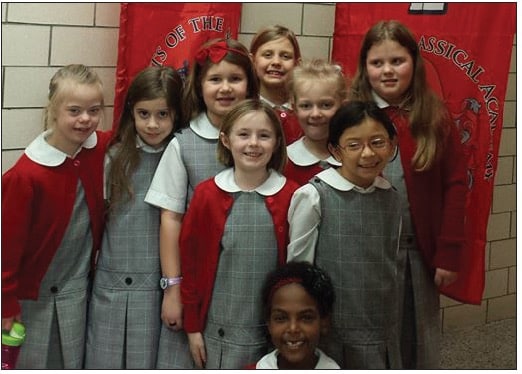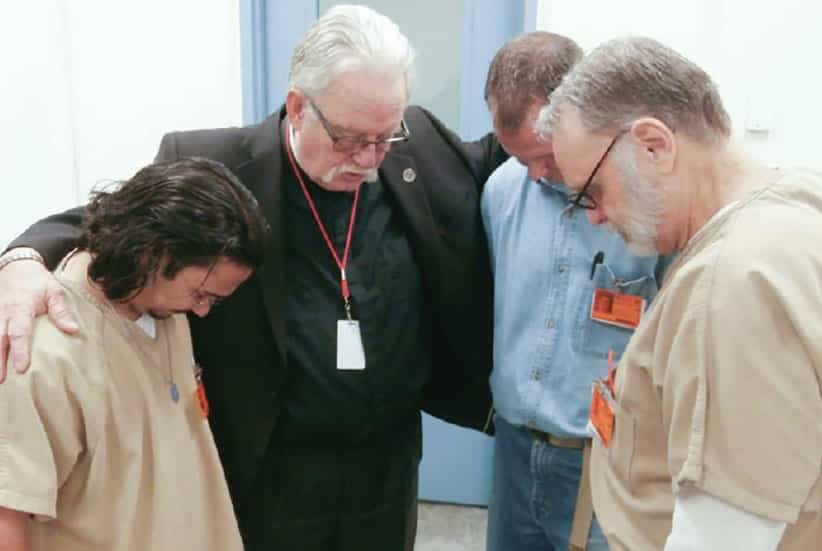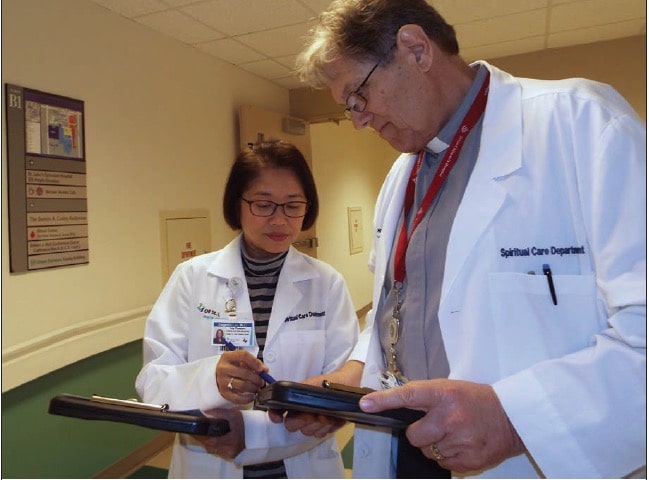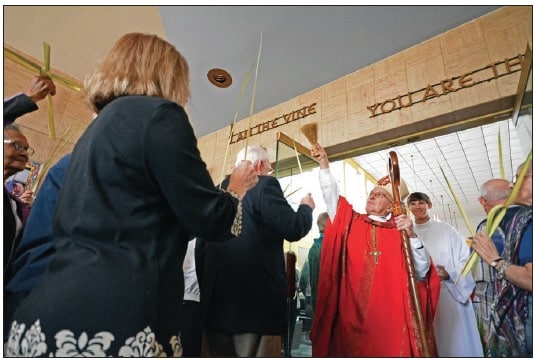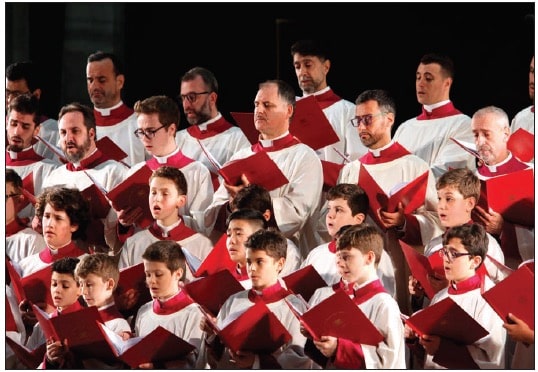Buzzwords like “inclusiveness” and “diversity” rarely are paired in the same breath with “saint” or “heaven.” But at Immaculata Classical Academy in Louisville, Kentucky, those words have been woven into its fabric from the time of its founding in 2010.
“We wanted to be a school for the whole family,” said Mary Parkinson, director of instruction and admissions. “We’re for all of your kids. The kids who are excelling, the kids who maybe need a little bit more help, the ones who are in between. Our overall goal for each of our students is that we want them to become saints.”
Represented, integrated
About 25 percent of the school’s 170 students have some sort of disability or special needs. Students with diagnosed disabilities comprise 9.3 percent of the overall population, according to the Exceptional Learners in Catholic Schools study provided by the National Catholic Educational Association.
That 25 percent of Immaculata students isn’t segregated into separate classrooms with their own curriculum. Rather, thanks to the school’s flexible nature, those children are integrated with their peers into the traditional classroom setting.
| Catholic Education in the United States |
|---|
|
– In 2016, about 50.4 million children attended public schools; 5.2 million children attended private schools, with almost 2 million in Catholic schools.
– There are 151,101 staff teaching in Catholic schools; 2.8 percent are religious or clergy.
– The student/teacher ratio in Catholic schools is 13:1.
Sources: National Catholic Educational Association, U.S. Conference of Catholic Bishops
|
What makes this possible? A few things, Parkinson said. First, the classroom sizes are kept small (at approximately 15 students and no more than 18). A strict schedule and adherence to good habits ensure efficiency, and prayer and virtue are at the center of student life. Also, the school operates on a four-day school week, 8 a.m.-3:30 p.m. A classroom-free Monday keeps Sunday a day of rest for families. The students study from home and are available to receive whatever extra attention or therapy they may need from outside sources. It also gives teachers and faculty a chance to meet and strategize for the week ahead.
“We team with parents, with each other, all for the education of these children, and no one is going to be able to do it all by themselves,” Parksinson said.
The NCEA recognizes that teamwork mentality as crucial. “If approaches to delivering a Catholic education to those with disabilities are to be successful, we must think how we support all teachers in this endeavor,” the report states.
Because each grade studies the same subject at the same time as the rest of the school, students easily are able to move up or down a grade in a subject if necessary. This flexibility also allows for strategic placement for students with special needs. A resource room stands ready if needed, and two special-needs coordinators are on hand to help teachers modify curriculums.
Called to this mission
Mike and Penny Michalak always had thought they’d adopt a baby with Down syndrome, in part because of their love for, and in honor of, Mike’s Uncle Ray.
They did go on to adopt three children with Down syndrome, but also welcomed their own birth daughter with Down syndrome, Elena, in 2008. They were horrified when they personally encountered how targeted the community was by pro-choice advocates. “Society paints these children as a burden,” Penny said.
They strongly felt called to found a school accessible to all. They started their K-8 school with 19 students in the basement of their office building — a “one-room schoolhouse” of sorts, Penny said.
Archbishop Joseph E. Kurtz of the Archdiocese of Louisville blessed the school and its mission, even before it was open, and has been an enthusiastic supporter ever since.
“My interest began because of my brother, Georgie, my older brother who had Down syndrome,” he said in a November 2016 video interview. “I know [Down syndrome children’s] capacity to love others and to change the environment of others. I’ve seen this happen now for seven years — it’s happened at Immaculata Classical Academy.”
Dedicated to Our Lady’s Immaculate Heart, under the special patronage of St. Maximilian Kolbe, the school has since moved to bigger facilities. It is an independent school, but is recognized by the National Association of Private Catholic and Independent Schools.
“So many parents have come into the school and just cried,” Penny told Our Sunday Visitor. “They said there was no school for them except for public school. That was the only solution. A lot of people believe their children with special needs deserve a Catholic education just as well as every other human being.”
Neither of the couple have a degree in education, or even the benefit of a Catholic education themselves. They’re not exactly blessed with an uncramped schedule, either — they are the proud parents of 16 children, 10 of whom are adopted. They own 15 restaurants and work with a Down syndrome charity, Angels in Disguise.
The school truly is one-of-kind, with the combination of classical, Catholic, inclusive and four-day school weeks, and it consequently is peppered with calls from across the country for advice. But they don’t let the challenges keep them from rising to the occasion.
“Look through history, the Church, going back 2,000 years. We saw orphans, we built orphanages. We saw sick people, we built hospitals,” Mike said. “The Catholic Church built an education system that was the envy of the world. It’s very important to work with the Church and take the lead.”
Pamela Bernards, the director of professional development at the NCEA, agrees. “The Lord has something special planned for all of his children during their life here on earth,” she told OSV. “As Catholic school educators, we have the blessed opportunity to be his hands and feet by helping his children, including those with disabilities, fulfill his plan for them here on earth and lead them to life with him in the hereafter.”
Dignity of all
There are many sweet moments in the school, as one can imagine, according to teacher Julie Morris. The day-to-day lifestyle “teaches appreciation and patience and virtue throughout the classroom, student to student, teacher to student, student to teacher.” It can be something as simple as Morris turning around to help a little girl with her vocabulary words, to see that another student already has jumped in to lend a hand.
Parkinson recalls a little boy who realized that special needs were something to be proud of, and so joyfully proclaimed to his dad one night that, “I have Down syndrome!”
“It’s a very diverse population, and I think that’s one of the things that keeps things joyful and keeps us grounded,” Parkinson said. “We know we have to reach so many different kinds of people.”
Teachers and faculty wouldn’t have it any other way.
“With God’s grace, all things are possible. To recognize the inherent dignity of every person, means that it’s worth going the extra mile to help every student,” Morris said. “There is a way, and God will guide you in that, as difficult as that may be. You just have to keep trying.”
Mariann Hughes writes from Florida.

